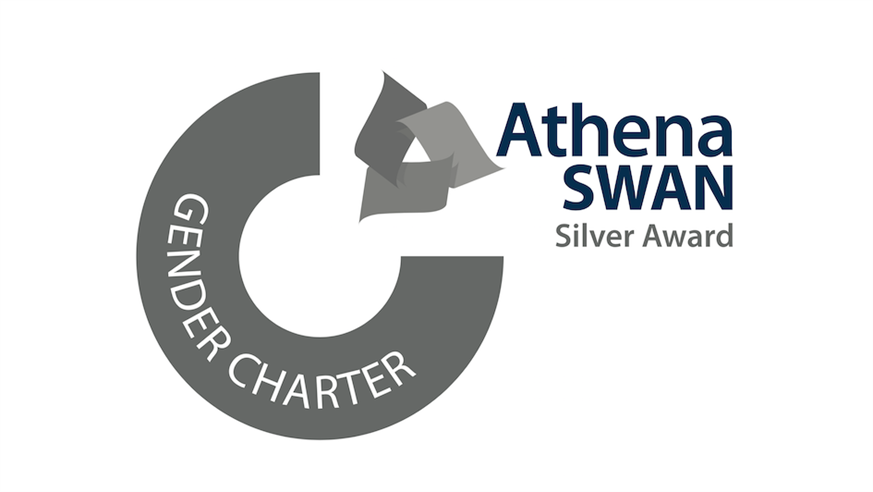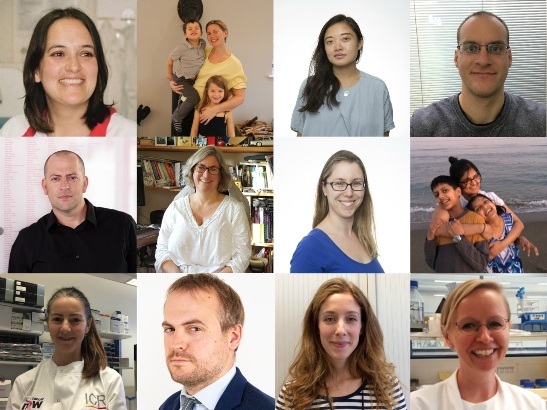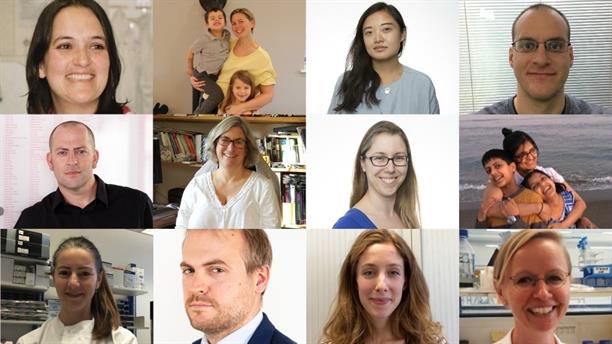
The ICR is celebrating the work of all our staff and students in creating an open, diverse and fully inclusive environment, with the award of an Athena SWAN Charter Silver Award for 2019–23.
We have come a long way since first gaining the silver award in 2016 – and have successfully met the new broader criteria for demonstrating inclusivity.
Since 2016, Advance HE – which works to shape the future of higher education through initiatives such as Athena SWAN – has widened out the award criteria for an Athena SWAN silver award to include support and progression for staff in professional and support roles as well as research careers.
It has also asked organisations to reflect on equality more widely to include ethnicity and intersectionality (the point where different parts of your identity – gender, race, disability, class, sexuality – interact in complex ways).
'Recognition of ICR's hard work in this area'
The new silver award sets a springboard for our ongoing commitment to increase equality across the ICR – with its recognition of the changes we have made to structures and policies to embed an inclusive and fair working environment, and work on our wider culture through the launch of our values and initiatives such as our wellbeing programme.
Professor Jessica Downs, Deputy Head of Cancer Biology and co-chair of the Athena SWAN network at the ICR, said: "All research benefits from having a diverse workforce – which includes and goes beyond gender equality. There are plenty of stats to show that greater diversity leads to improved organisational performance.
“Working in an environment where you feel valued and where you have equal opportunities allows you to realise your own potential. I’m delighted our Athena SWAN silver award for 2019–23 recognises the ICR’s hard work in this area, and look forward to continuing work with colleagues across the ICR to shape important, practical solutions that can really make a difference to someone in the workplace."
'Creating a more inclusive, supporter, and kinder research culture'
Dr Vanessa McKean, Equality, Diversity and Inclusion Manager at the ICR commented: "I'm incredibly proud that the ICR has been awarded an Athena SWAN Silver award, in recognition of the impact of our work on gender equality and developing our inclusive culture.
"The best part of my job is seeing the results of our Athena SWAN and culture change activities in the lives of our staff and students. Much of this comes through looking at trends in staff and student data: for example, our postdoc alumni data sets show that we are preparing our male and female postdocs for research leadership, and that they are equally attaining team leader roles in other institutes.
"Often impact is best seen in the lives and experiences of individuals. For example, hearing from my colleagues how Athena SWAN activities have made their working lives better, how the BAME Forum's Black History Month seminars affect them, or how our children are inspired by Family Days in the labs. In our close-knit research institute, we've established an environment where staff and students feel able to tell us their concerns and share their ideas on how we could do better. Our actions are creating a more inclusive, supportive and kinder research culture."
Our next steps
A four-year action plan led by the Athena SWAN steering group aims to drive greater equality across genders and different ethnic groups across all career paths, and will tie into a wider People, culture and engagement programme.
We are committing in particular to increasing representation of women at Faculty level and to focus on the careers and progression of Black, Asian and minority ethnic staff across the ICR.
Our Athena SWAN steering group will be responsible for taking forward the new action plan with a view to preparing the ICR for a future gold-level submission.
Professor Paul Workman, Chief Executive of the ICR, and co-chair of the Athena SWAN committee said: "I am personally committed to enhancing the career opportunities for all our staff across the organisation, whatever their gender, ethnicity or sexuality. I believe that the actions we are taking will help us attract and retain the very best scientists and corporate colleagues across the board.
“The 2019 silver Athena SWAN award is a testament to the positive changes we have been making across the ICR – and we are keen to share successes and learning more widely across the university and research sector. There is still a way for all of us to go, but it’s really positive to see the commitment across the organisation to making this happen.”
Highlights from our report
Stop the clock policy
Individual researchers benefited from our 'stop the clock' policy, introduced prior to our 2016 application, enabling those in time-limited academic and clinical academic roles to have their contracts extended to cover maternity leave and other career breaks.
“At my Tenure-Track Faculty interview I was heavily pregnant with my second child. I decided to apply because of the ‘stop the clock’ policy– meaning I could take a break for my maternity leave without it impacting the six-year limit on the Faculty Track. If I was on a straight six-year clock I wouldn’t have been able to do this.” — Dr Rachael Natrajan, Team Leader
“It was invaluable to have the ‘clock stopped’ during my year of maternity leave…. To have that extra little bit of job-security as a postdoc in the longer term is fantastic. It will take some of the pressure off deciding when to come back to work and organising childcare.” — ICR Postdoctorate researcher
Family friendly policies
Women in Faculty roles are now supported by a maternity cover fund, which supports laboratory management where maternity leave is taken.
We have introduced substantial support for parents and carers, embedding family-friendly policies and initiatives. Examples of changes we have implemented include access for children to the Chester Beatty Laboratories, guidance around holding meetings within core hours, and support for parents and carers to attend training and conferences. We also hold regular ICR family days – opening up the ICR labs to our staff, students and their families.
“As a widowed single father of two young children, it’s important to me that my employer appears engaged with and supportive of the challenges I face in establishing a manageable level of work-life balance, as well as helping me in my working life. The fact that initiatives for parents and carers are being celebrated through our staff communications – along with a wider celebration of our diverse and inclusive culture – gives single parents like me the feeling that we are being supported, including by the senior leadership, and that we have the power to raise issues that are important to us.” — Corporate Services Manager
“Last year I was awarded £250 from the ICR’s conference and training care support fund. This meant I was able to pay for my parents to fly over from Spain to look after my children while I was at a week-long research retreat. The retreat was a valuable experience for me as I was able to learn more about the work of my collaborators, show them my research and expand my network.” — Dr Mercedes Pardo Calvo, Senior Scientific Officer
“My children (and me and my husband!) really enjoyed the ICR Family Day! Working in corporate services I don't get to see the labs so I learnt lots too! My son now wants to be a scientist and use robots!” — Sarita Coleman, HR Projects and Systems Manager
“I think the Children in CBL scheme is very important for the ICR as it recognises the importance of our family lives to our general wellbeing. As well as being scientists, many of us are mums, dads, grandparents and carers – letting our families and dependents see where we work lets them appreciate what we do and, perhaps more importantly, lets them meet the dedicated people we work with.” — Professor Chris Lord, Deputy Head of Breast Cancer Research
Providing career development opportunities
In 2009 we introduced our dedicated career development programme for postdocs. The programme has grown over time to include Pathway to Independence, mentoring and advice on succeeding in industry. Alumni tracking found male and female postdocs staying in research careers and reaching team leader roles in equal proportions. Success in reaching team leader roles was also the same across different ethnic groups.
Some 62 women have taken part in our leadership programmes aimed at Corporate Services staff and scientific officers – the external, female-only Aurora programme and our own Future Female Leaders course, now also accessible to men. Women on these programmes are more successful than the grades as a whole at internal promotion and promotion elsewhere.
“Securing a space on Aurora has been a real confidence boost – and emphasised how I feel supported and valued by the ICR in my career here.” — Rose Wu, Editorial and Internal Communications Manager, 2019 Aurora participant and BAME Forum deputy chair
Supporting flexible working
We support choice and flexibility around working patterns, and the ICR has published a flexible working booklet, sharing examples and case studies of flexible working across the ICR.
"Nowhere else is going to allow me flexible working, expenses to go to conferences, working from home when my child is sick, childcare vouchers and being able to come in at 5am on the weekends to finish something off." — Dr Jumi Poopola, Former ICR Higher Scientific Officer
“Flexible working has allowed me to regain my work-life balance and as a result I am now a more confident, productive and happy ICR employee.” — Dr Rachel Brough, Senior Scientific Officer
“My achievements as Chair of the STEM Public Relations Association have always been recognised in my annual appraisals, and my managers have been very supportive of any flexible working that was often required to fulfil my responsibilities to the organisation. They recognised that the experience I drew from the role would be beneficial to the ICR – extending its reach, influence and profile as an investor in people and leading science communication organisation, as well as a world leader in cancer research – and to my own professional development. — Claire Hastings, Senior Media Manager
Supporting women in science
Our Women in Science network provides a space for our female Faculty members, senior staff scientists and senior research-active clinicians to network and share ideas.
“The network provides a great space to share experiences and knowledge of the ‘informal’ side of career development – unwritten ways to raise your profile and impact.” — 2018 participant
Building an inclusive culture
The ICR has introduced major organisational initiatives to build an inclusive culture – from the launch of our values in November 2018, to a comprehensive programme of prevention and early detection to eliminate bullying and harassment, an organisation-wide campaign around mental health and wellbeing including the introduction of wellbeing adviser roles, and the growth of our equality and diversity networks.
"Living with a mental health problem can make big life events like changing job feel pretty overwhelming. My first day at the ICR I sat down to find this card on my desk which was full of information about all the wellbeing support available here, and it was really clear that there are plenty of places to go when things get stressful. It's great to know that I'm working for an organisation that takes my wellbeing seriously, and has my back." — Joanne Duffy, Science Communications officer
The LGBT+ Network’s activities are strongly underpinned by the continuous support by the Athena SWAN programme to bring about cultural change at the work place. It is a longstanding notion that being true to one’s own inner core is the path to personal fulfilment and happiness. The LGBT+ network strives to achieve this aim by facilitating and supporting all our staff, with a special emphasis on non-normative representation and all-encompassing inclusiveness.” — Dragomir Krastev, Senior Scientific Officer
Supporting clinical academics
Work has taken place to support clinical academics – including the introduction of the BRC Clinical Academic Careers Training Programme. NHS service is also now counted as part of continuous service for the purposes of maternity and other leave.
“The Clinical Pathway to Independence programme transformed my thinking about my career and helped me focus on an academic career” — 2016 participant

